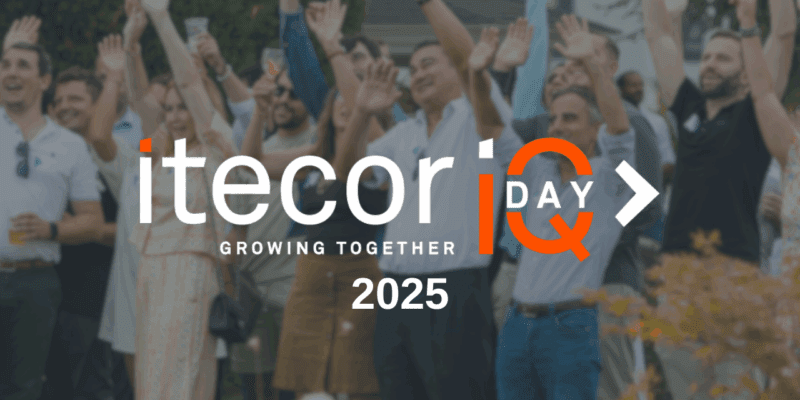working@itecor
driving change: from challenge to collective momentum
Itecor · November 13, 2025
Itecor · November 13, 2025
Change is a constant in life. Everything that lives evolves, and organisations are no exception. Isn’t refusing the inevitable tantamount to slowly dying out? Naturally, we may see change as a threat, when in fact it is simply an invitation to adapt, grow and explore new avenues.
Indeed, it shakes up our bearings and awakens enthusiasm and resistance. Should we really approach it with fear, or rather see it as an opportunity?
This quote reminds us that change begins within each of us but takes on its full value when it is shared and questioned collectively. Asking the right questions together, comparing points of view, and getting to the root of what needs to change paves the way for fairer and more sustainable solutions. This approach is part of our education and the culture of our organisations.
Change is not a monster to be feared: when approached methodically, it becomes an opportunity to create something new, learn and grow together.
Change does not begin on the day it is announced. It takes root much earlier, in the ability to spot the signs, identify potential points of tension and understand what the transition means in practical terms for the business.
When introducing a new management tool, for example, a pilot group will help to identify any difficulties in use at an early stage and adapt the training accordingly.
Where are we likely to encounter resistance?
What resources do we actually have at our disposal?
What skills will need to be strengthened so that everyone feels ready?
The people who constitute an organisation do not simply follow instructions. They create the conditions that make transformation possible and sustainable. This can take the form of visible benchmarks, such as a shared calendar of important milestones, constant dialogue between management and the field, or support from trusted advisors. Trained, experienced and equipped, they provide attentive listening, an outside perspective and the ability to ask questions in a supportive manner.
Who will be my trusted intermediaries?
How can I balance official messages with feedback from the field?
What does my team need, in practical terms, to move forward without feeling lost?
Psychological safety, as described by Amy Edmondson , is the belief that everyone can ask questions, propose ideas or acknowledge mistakes without fear of negative consequences. It is part of a healthy environment, where trust and mutual respect encourage people to speak up and reduce tensions. This type of climate brings serenity, strengthens cooperation and stimulates creativity.
When launching a new product or service, establishing a simple ritual can be beneficial: each meeting begins with a sharing of initiatives and lessons learned. Far from fuelling fear, this time is used to learn collectively and to value experimentation.
Do my colleagues feel free to say "I don't know"?
How do we react when a mistake is made?
What practices encourage sincere and respectful communication?
The strength of a group is evident when it is based on shared reference points. Whether these are regular rituals, opportunities for synchronisation or informal moments, these reference points provide visibility and reinforce the sense of belonging.
In an internal transformation programme, a simple periodic visual checkpoint can serve as a common thread. Everyone can then follow progress and see where they fit into the shared story.
What benchmarks do we need to stay on track?
How can we show that everyone is involved?
What simple actions or rituals can maintain motivation on a daily basis?
Psychologist Kurt Lewin showed that decisions made collectively are better accepted than those imposed. An organisation that involves its employees from the outset moves from change that is endured to change that is chosen. That is why our communities of practice are truly vibrant places for exchange. We share experiences, find mutual support, disseminate useful practices and work together to devise solutions tailored to the field. They enable employees to learn from each other, feel less isolated and transform diversity into wealth.
Do we feel involved in building the transformation, or only in executing it?
What have we learned recently that is worth sharing?
What difficulties encountered by some could be avoided by others?
Where do we see an opportunity to create a new way of doing things together?
The success of a transformation is measured by its everyday use. Adoption cannot be improvised. It relies on three essential levers: giving meaning to the “why”, developing skills and embedding new habits over time.
Is what we have put in place actually being used?
Do employees clearly understand the reason for this change?
Which new practices are taking hold, and which are still struggling to emerge?
Successful transformation is therefore above all a collective adventure, where anticipation, support, psychological safety and cohesion play a decisive role.
At Itecor, our Change Managers support organisations in this dynamic, creating the conditions for change to become a real lever for performance. We believe that when these elements come together, change ceases to be an isolated challenge and becomes a shared opportunity, driven by rich interactions and diverse points of view.
To discover how this approach translates into practice, we invite you to read the interview with Nadège Martinet : facilitating the adoption of a business solution: the challenge of change management and to explore our offering dedicated to change management: driving adoption through change management.
| Cookie | Duration | Description |
|---|---|---|
| __hssrc | Session | This cookie is set by Hubspot whenever it changes the session cookie. The __hssrc cookie set to 1 indicates that the user has restarted the browser, and if the cookie does not exist, it is assumed to be a new session. |
| _GRECAPTCHA | 5 months 27 days | This cookie is set by the Google recaptcha service to identify bots to protect the website against malicious spam attacks. |
| cookielawinfo-checkbox-advertisement | 1 year | Set by the GDPR Cookie Consent plugin, this cookie is used to record the user consent for the cookies in the "Advertisement" category . |
| cookielawinfo-checkbox-analytics | 11 months | This cookie is set by GDPR Cookie Consent plugin. The cookie is used to store the user consent for the cookies in the category "Analytics". |
| cookielawinfo-checkbox-functional | 11 months | The cookie is set by GDPR cookie consent to record the user consent for the cookies in the category "Functional". |
| cookielawinfo-checkbox-necessary | 11 months | This cookie is set by GDPR Cookie Consent plugin. The cookies is used to store the user consent for the cookies in the category "Necessary". |
| cookielawinfo-checkbox-others | 11 months | This cookie is set by GDPR Cookie Consent plugin. The cookie is used to store the user consent for the cookies in the category "Other. |
| cookielawinfo-checkbox-performance | 11 months | This cookie is set by GDPR Cookie Consent plugin. The cookie is used to store the user consent for the cookies in the category "Performance". |
| CookieLawInfoConsent | 1 year | CookieYes sets this cookie to record the default button state of the corresponding category and the status of CCPA. It works only in coordination with the primary cookie. |
| JSESSIONID | session | New Relic uses this cookie to store a session identifier so that New Relic can monitor session counts for an application. |
| viewed_cookie_policy | 11 months | The cookie is set by the GDPR Cookie Consent plugin and is used to store whether or not user has consented to the use of cookies. It does not store any personal data. |
| Cookie | Duration | Description |
|---|---|---|
| __cf_bm | 30 minutes | This cookie, set by Cloudflare, is used to support Cloudflare Bot Management. |
| __hssc | 30 minutes | HubSpot sets this cookie to keep track of sessions and to determine if HubSpot should increment the session number and timestamps in the __hstc cookie. |
| Cookie | Duration | Description |
|---|---|---|
| __hstc | 1 year 24 days | This is the main cookie set by Hubspot, for tracking visitors. It contains the domain, initial timestamp (first visit), last timestamp (last visit), current timestamp (this visit), and session number (increments for each subsequent session). |
| _ga | 2 years | The _ga cookie, installed by Google Analytics, calculates visitor, session and campaign data and also keeps track of site usage for the site's analytics report. The cookie stores information anonymously and assigns a randomly generated number to recognize unique visitors. |
| _ga_* | 1 year 1 month 4 days | Google Analytics sets this cookie to store and count page views. |
| _ga_JYCPSB48B8 | 2 years | This cookie is installed by Google Analytics. |
| _gat_gtag_UA_* | 1 minute | Google Analytics sets this cookie to store a unique user ID. |
| _gid | 1 day | Google Analytics sets this cookie to store information on how visitors use a website while also creating an analytics report of the website's performance. Some of the collected data includes the number of visitors, their source, and the pages they visit anonymously. |
| CONSENT | 16 years 2 months 25 days 10 hours | YouTube sets this cookie via embedded youtube-videos and registers anonymous statistical data. |
| hubspotutk | 1 year 24 days | This cookie is used by HubSpot to keep track of the visitors to the website. This cookie is passed to Hubspot on form submission and used when deduplicating contacts. |
| Cookie | Duration | Description |
|---|---|---|
| IDE | 1 year 24 days | Google DoubleClick IDE cookies are used to store information about how the user uses the website to present them with relevant ads and according to the user profile. |
| test_cookie | 15 minutes | The test_cookie is set by doubleclick.net and is used to determine if the user's browser supports cookies. |
| VISITOR_INFO1_LIVE | 5 months 27 days | A cookie set by YouTube to measure bandwidth that determines whether the user gets the new or old player interface. |
| YSC | Session | YSC cookie is set by Youtube and is used to track the views of embedded videos on Youtube pages. |
| yt-remote-connected-devices | never | YouTube sets this cookie to store the user's video preferences using embedded YouTube videos. |
| yt-remote-device-id | never | YouTube sets this cookie to store the user's video preferences using embedded YouTube videos. |
| Cookie | Duration | Description |
|---|---|---|
| VISITOR_PRIVACY_METADATA | 5 months 27 days | Description is currently not available. |



